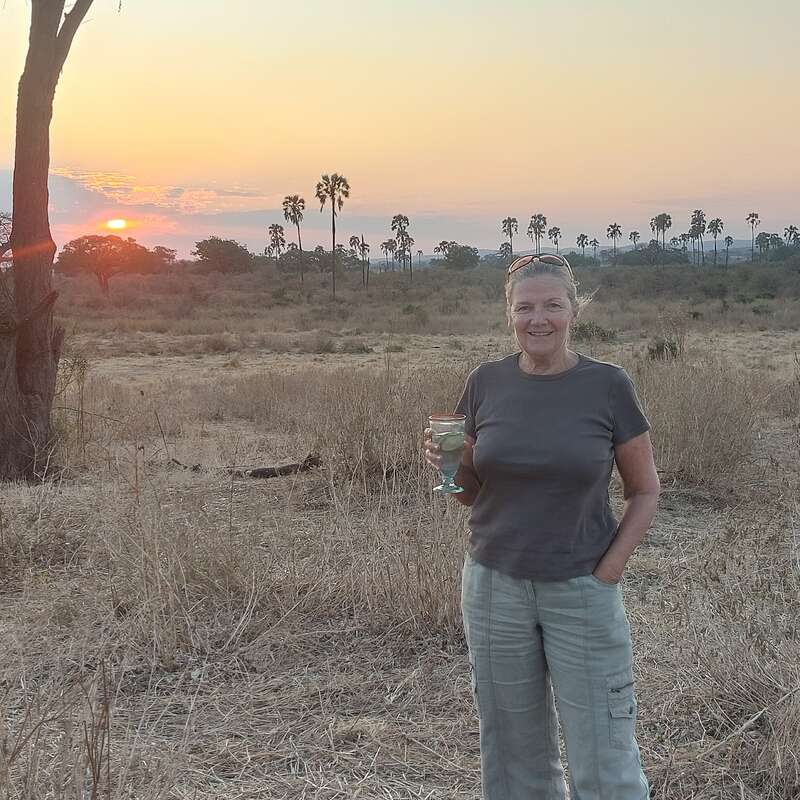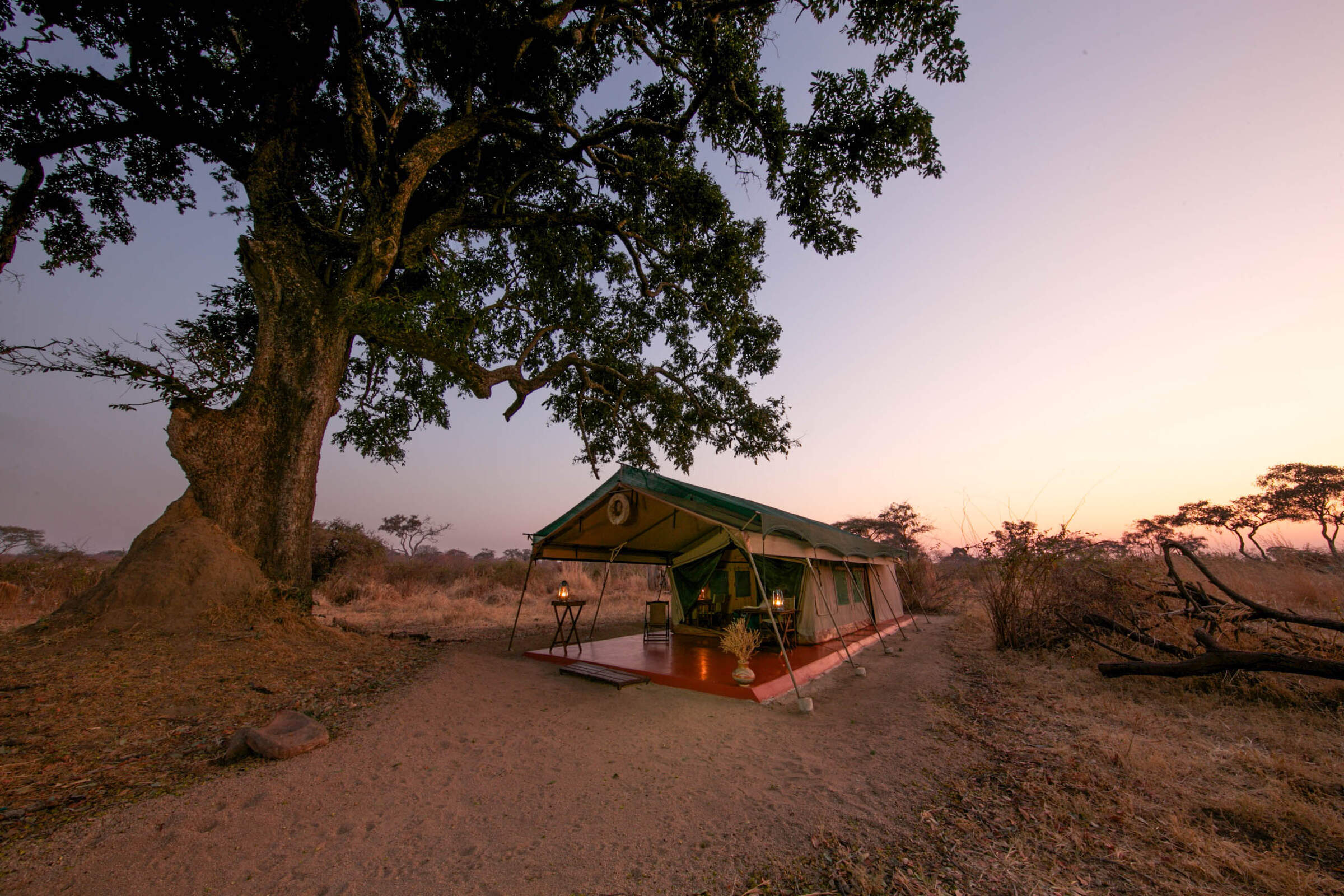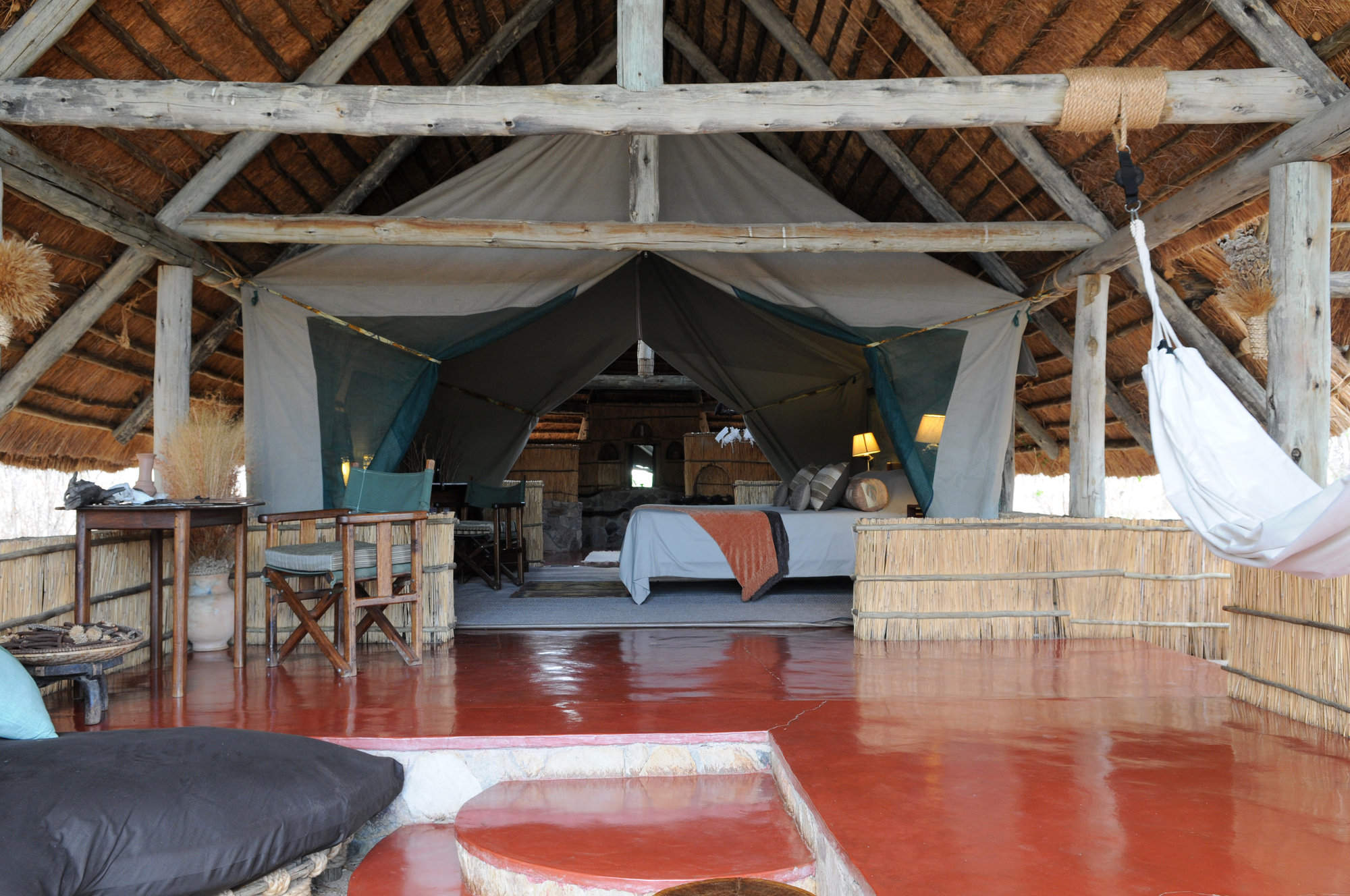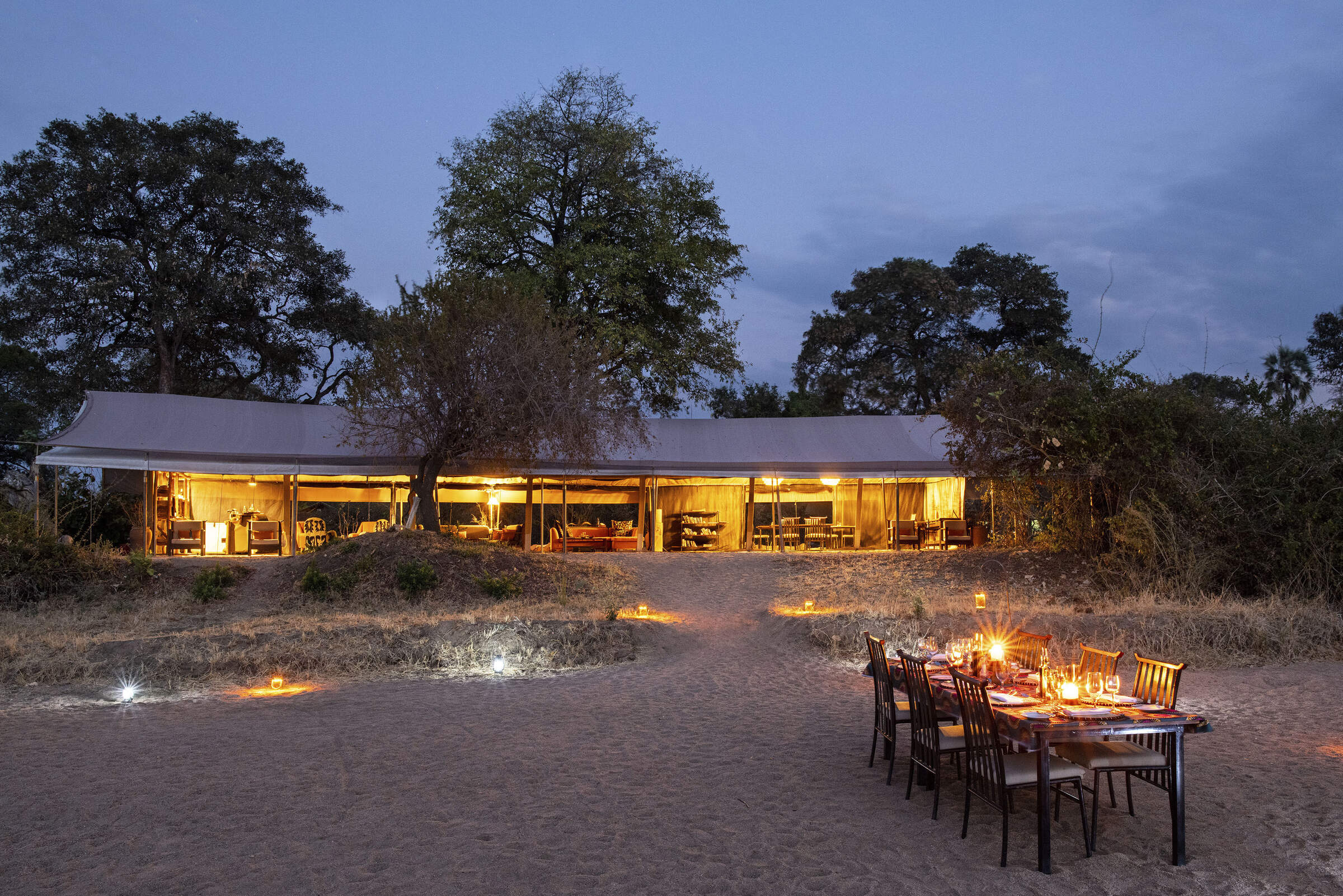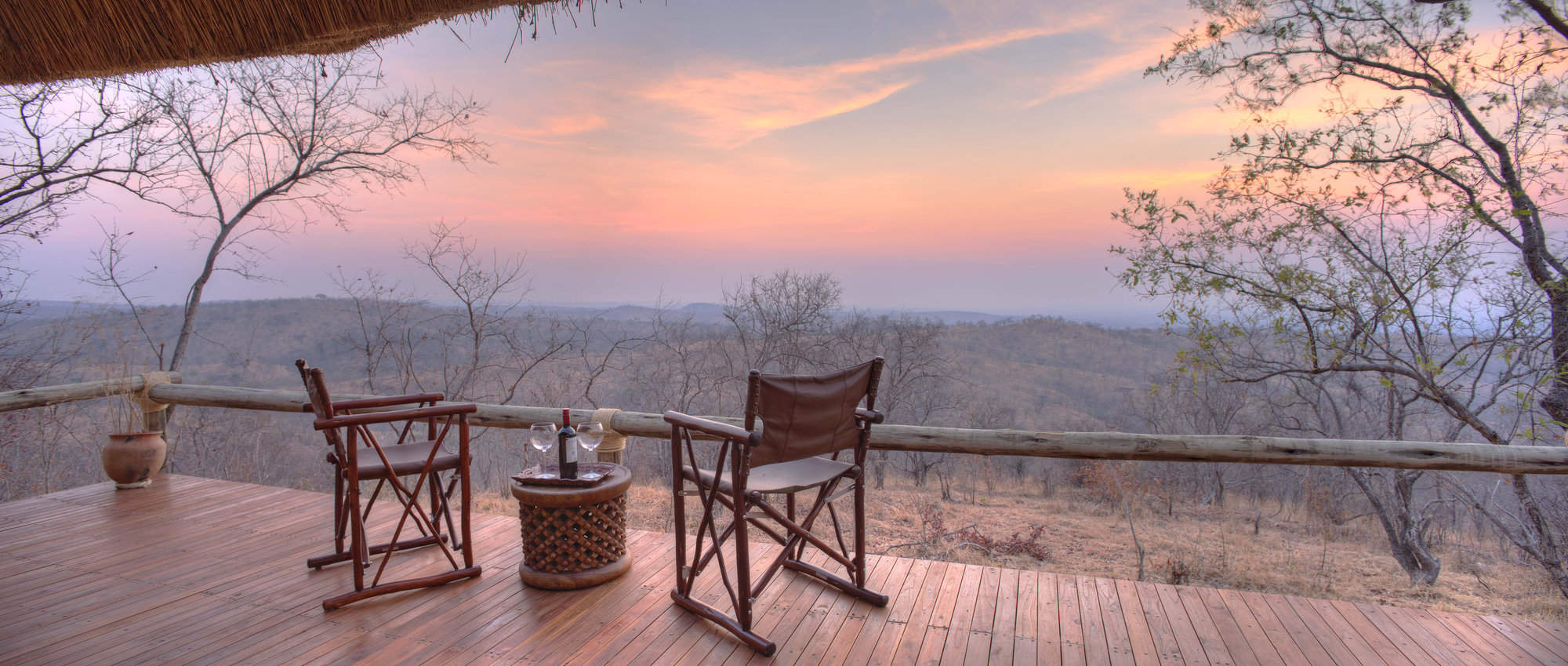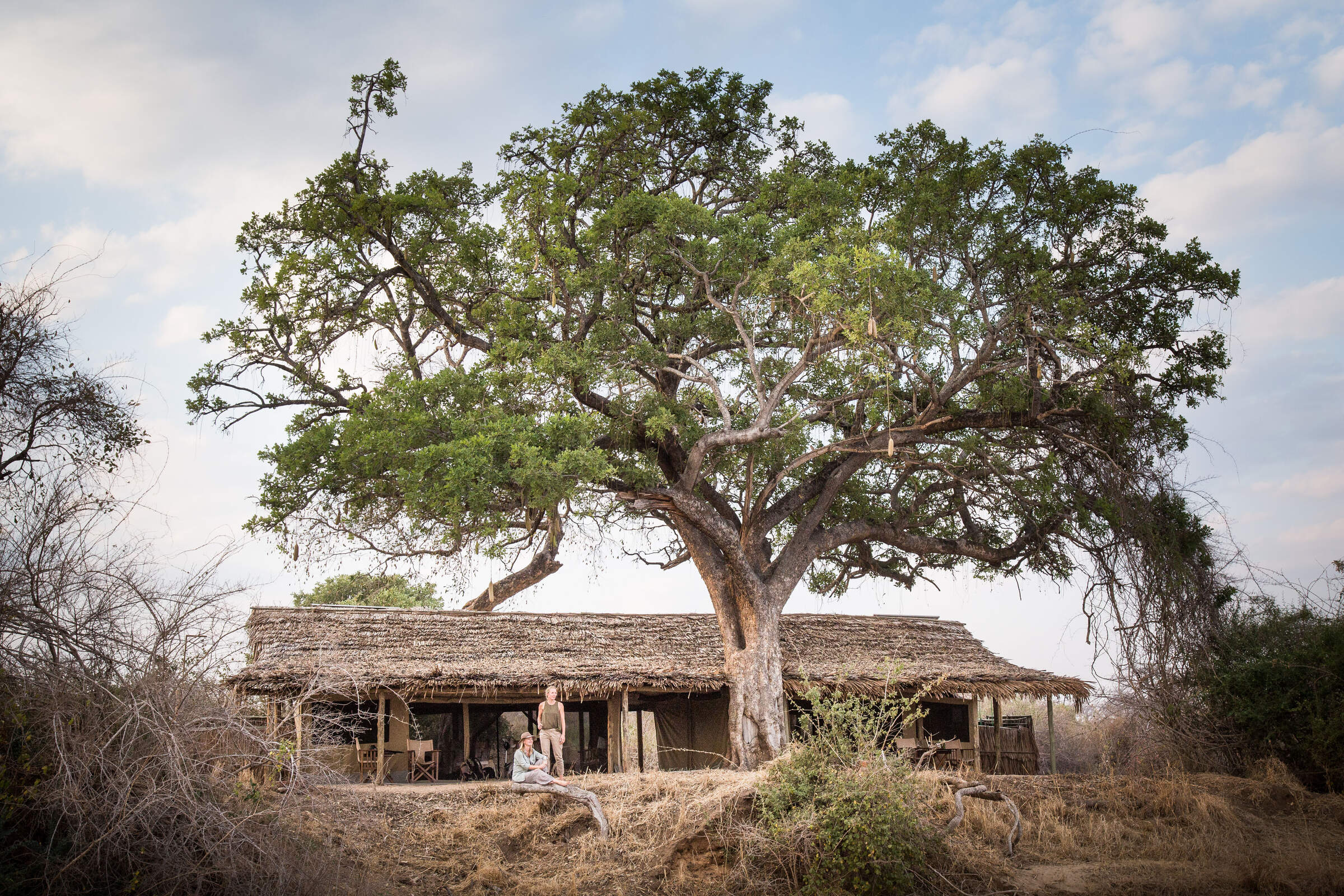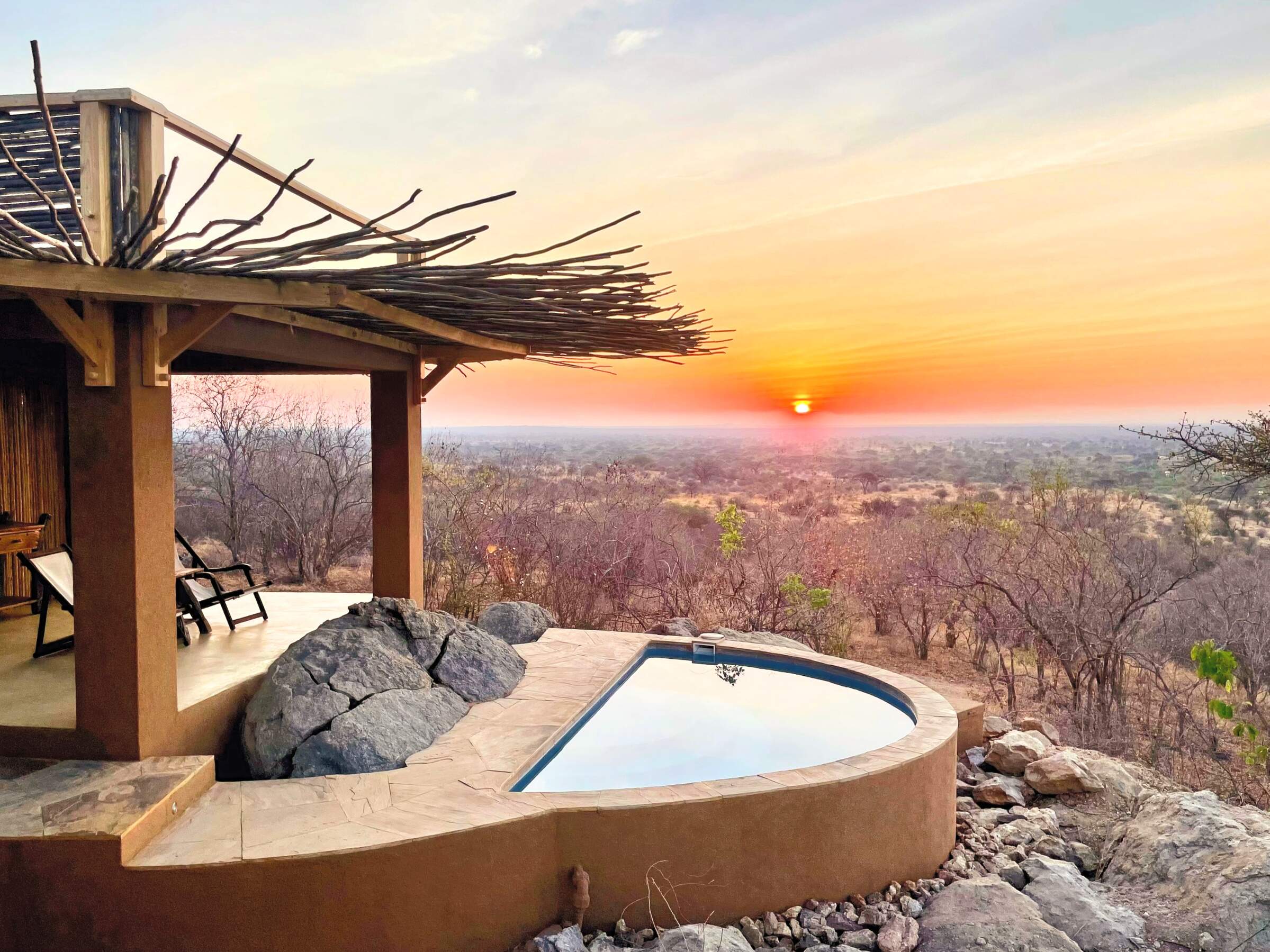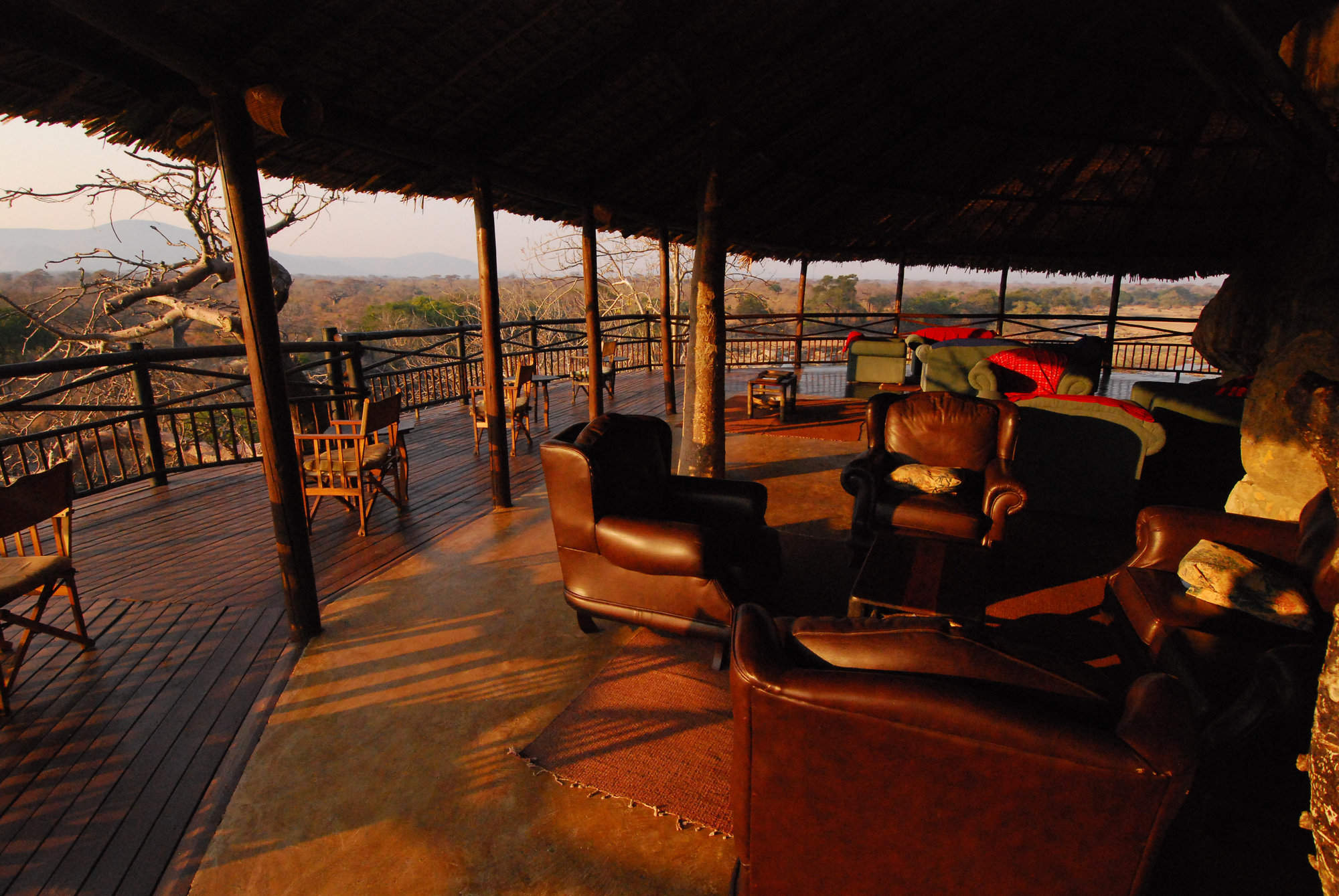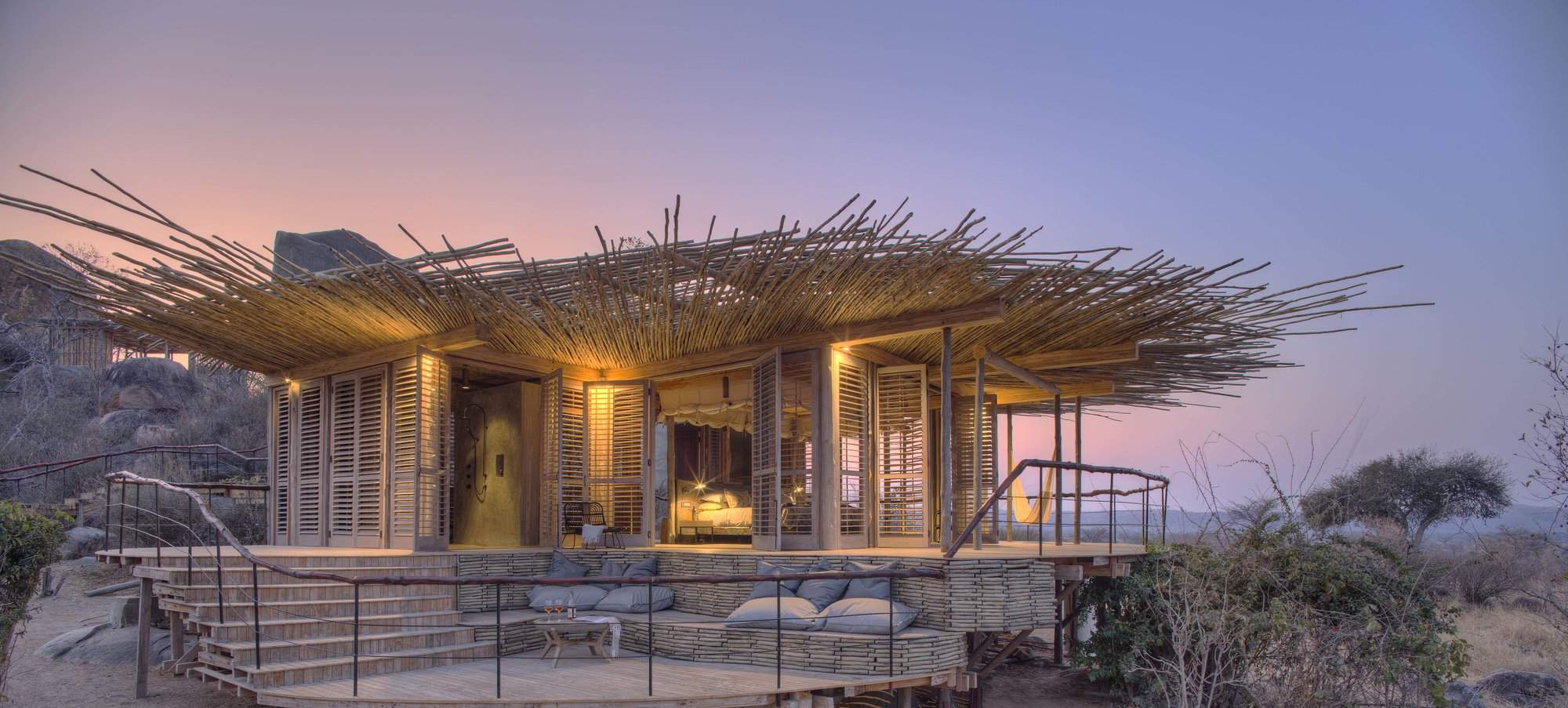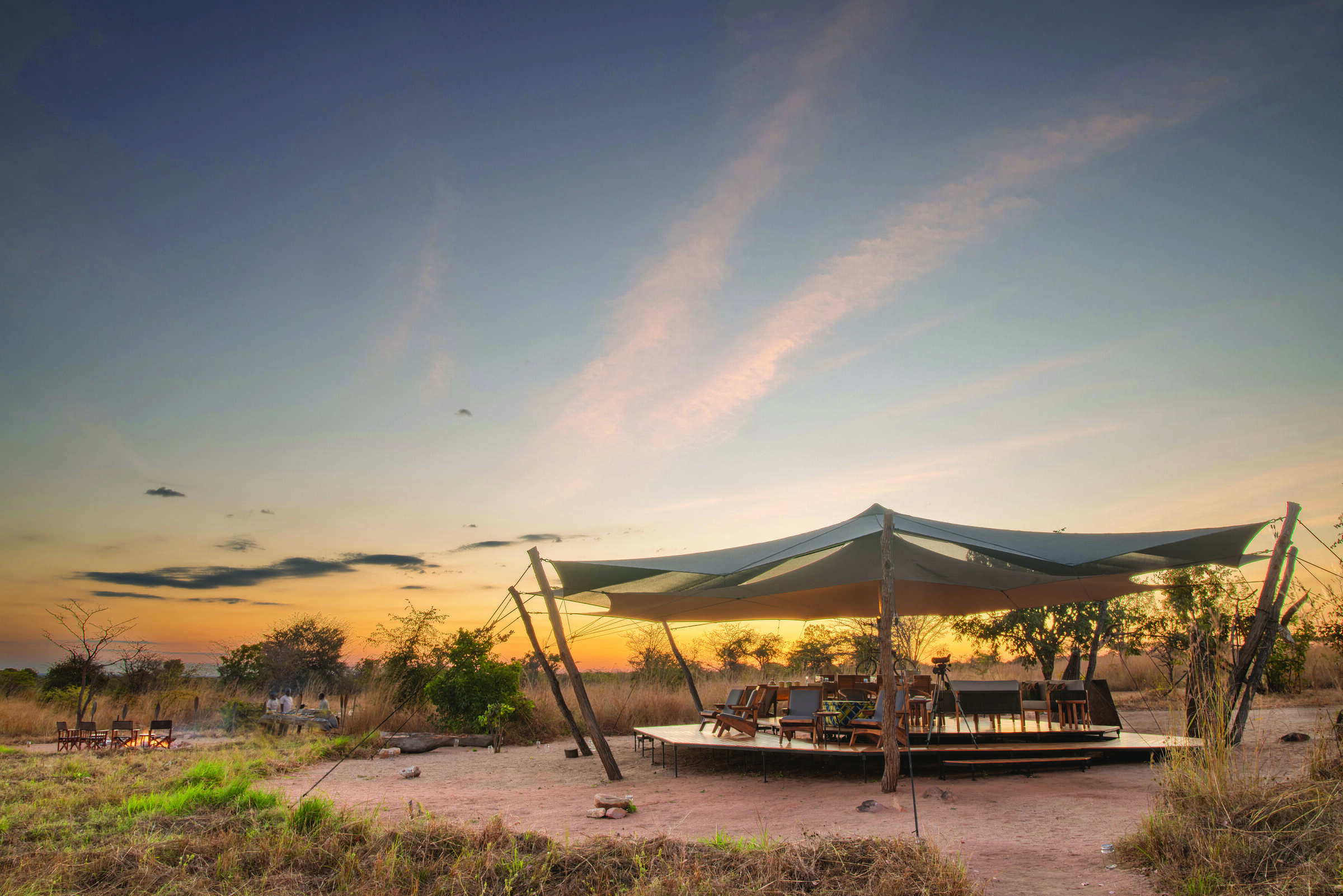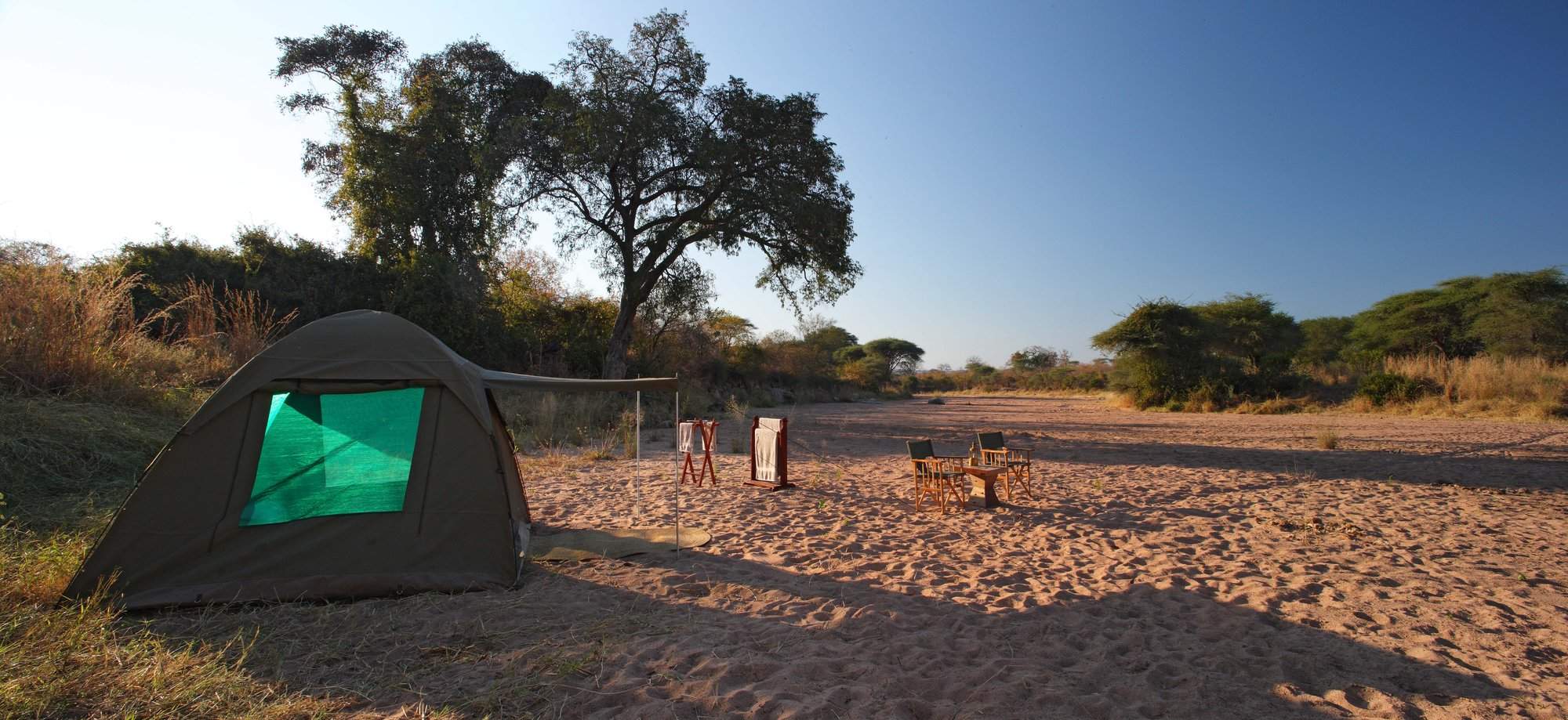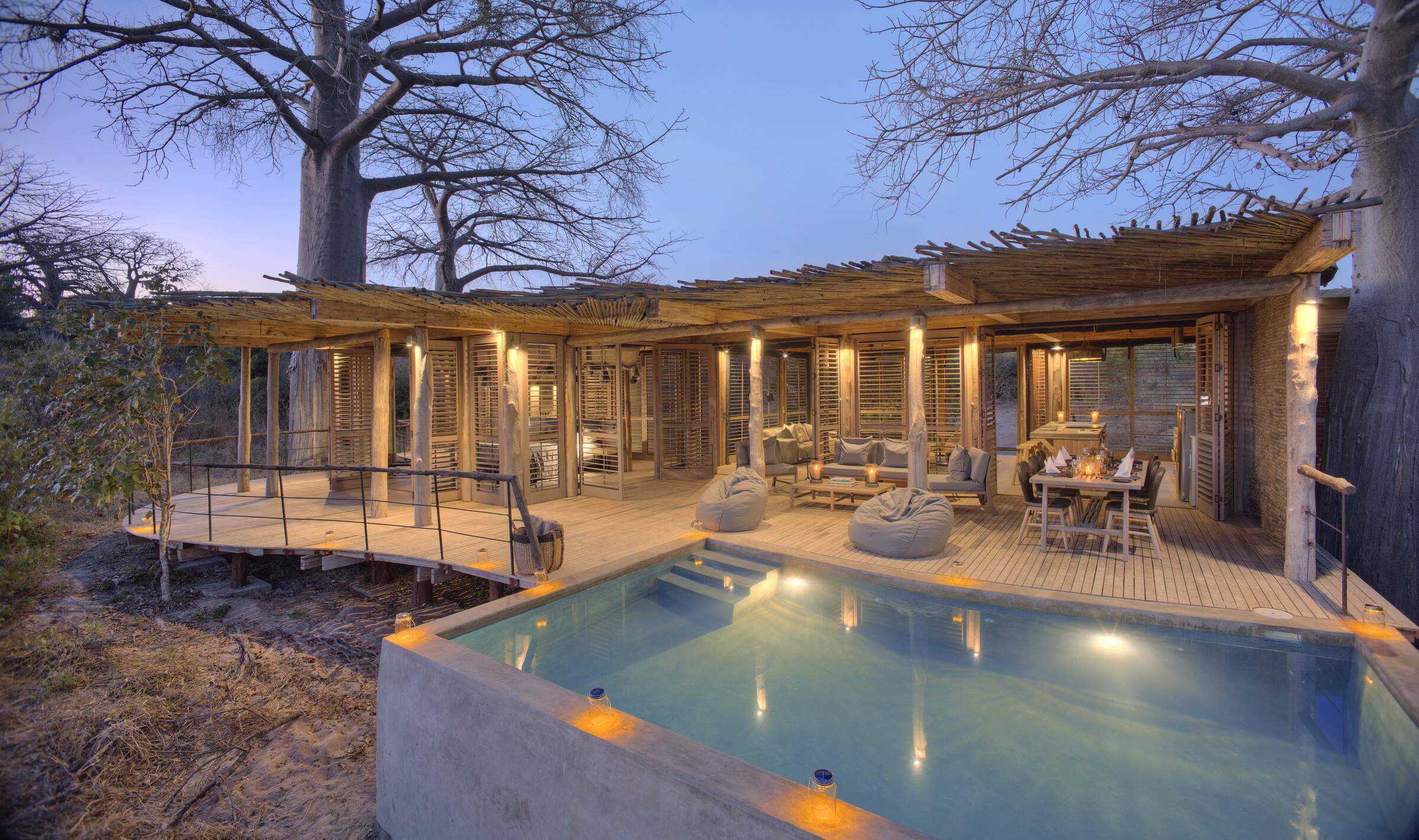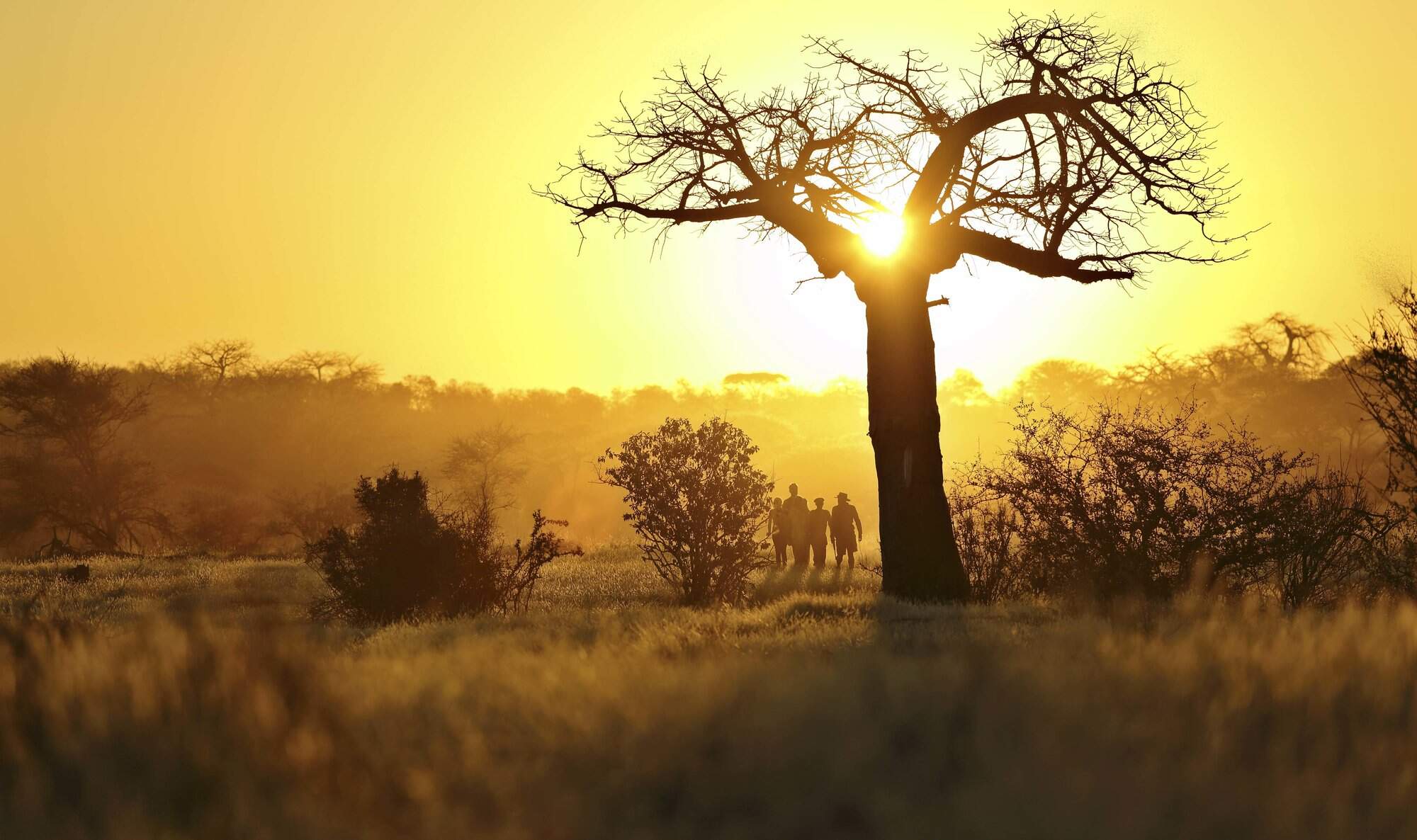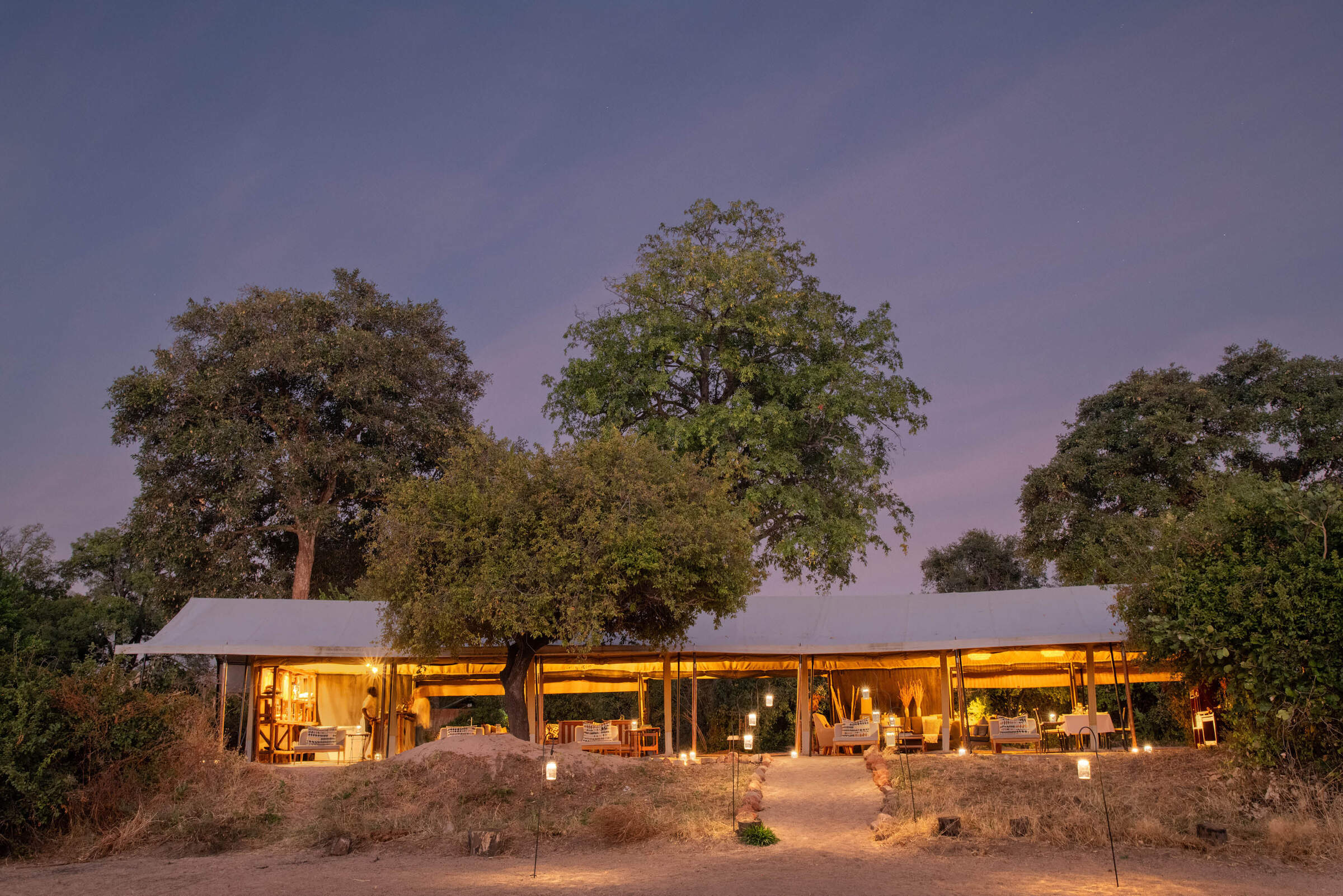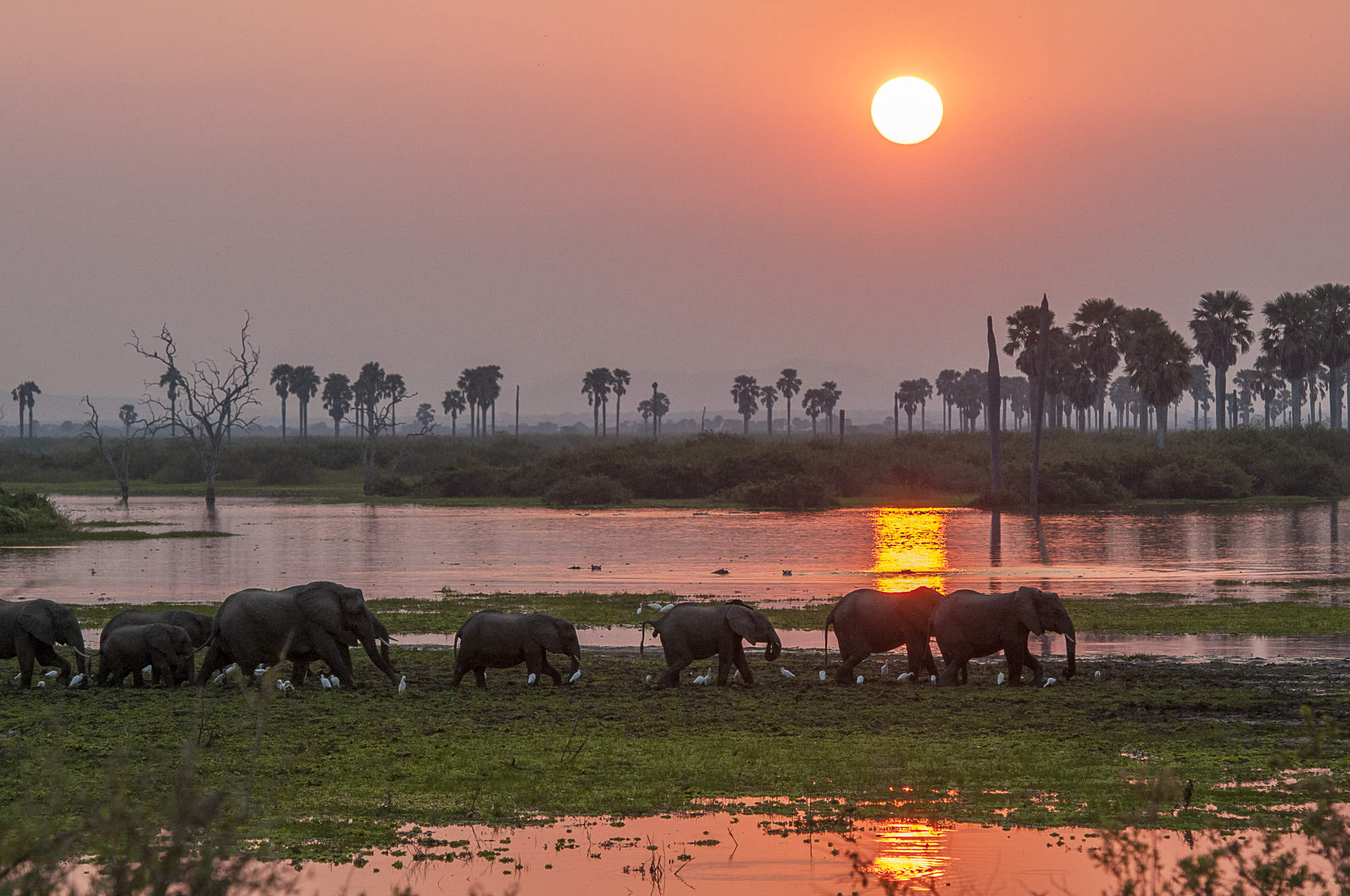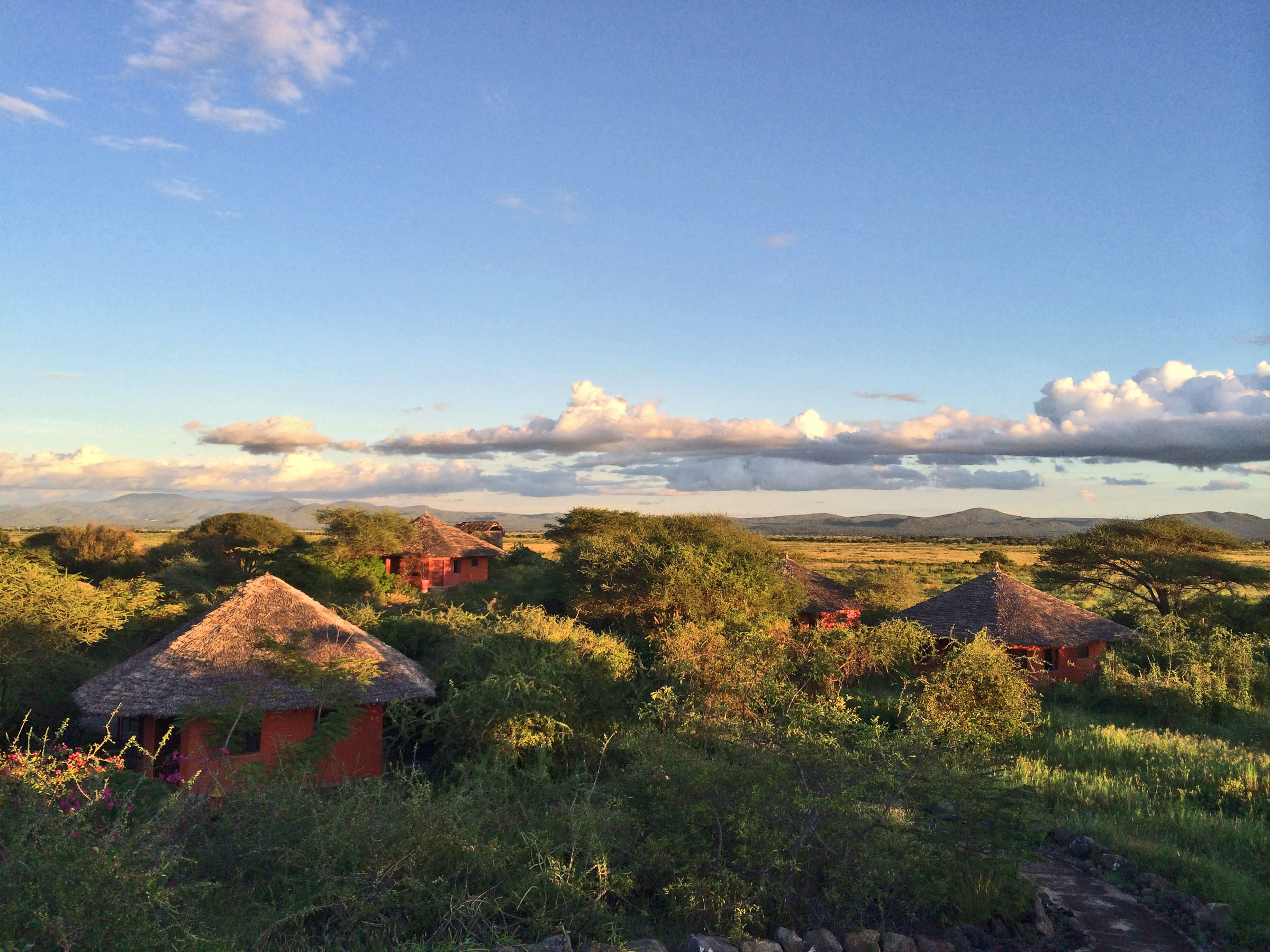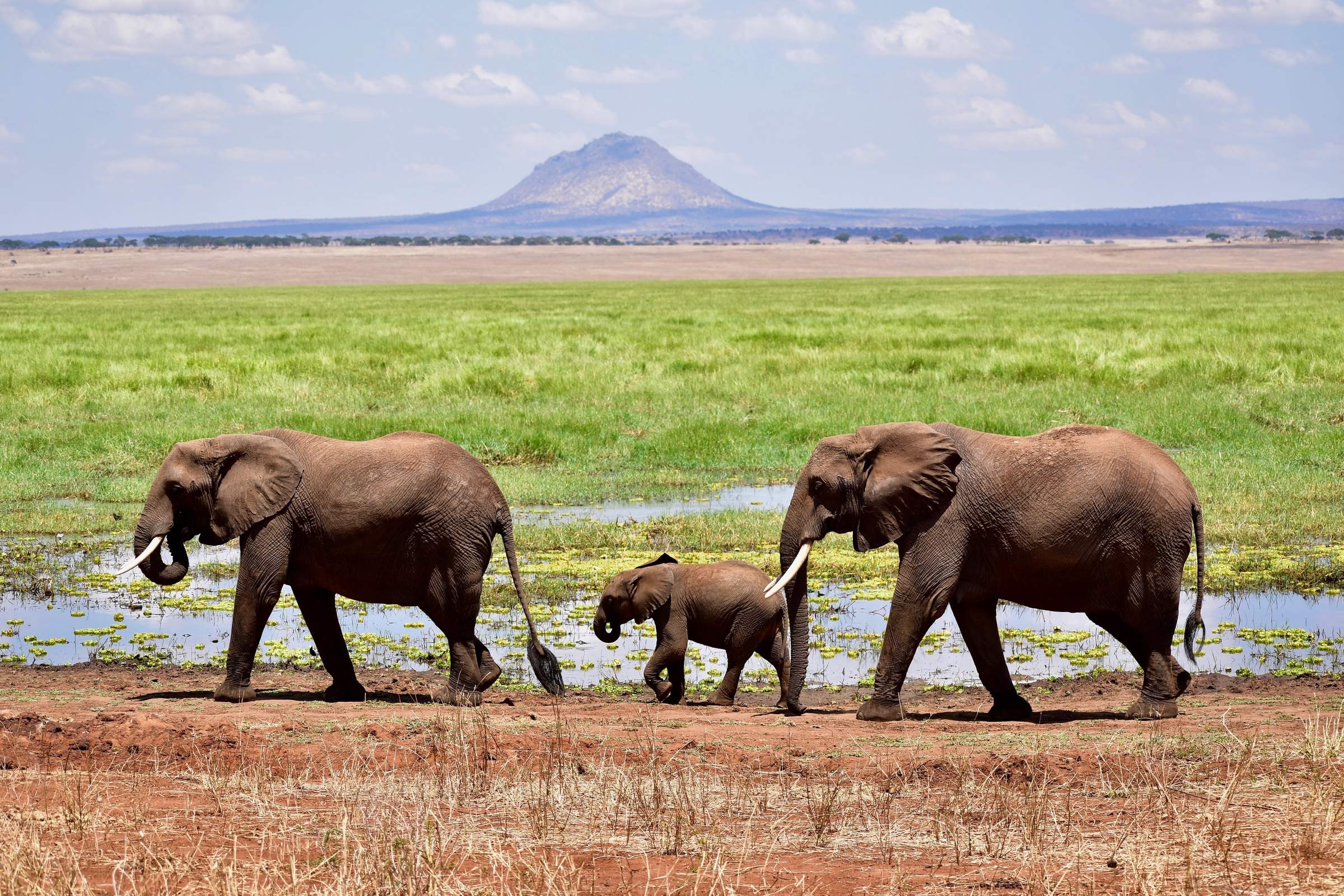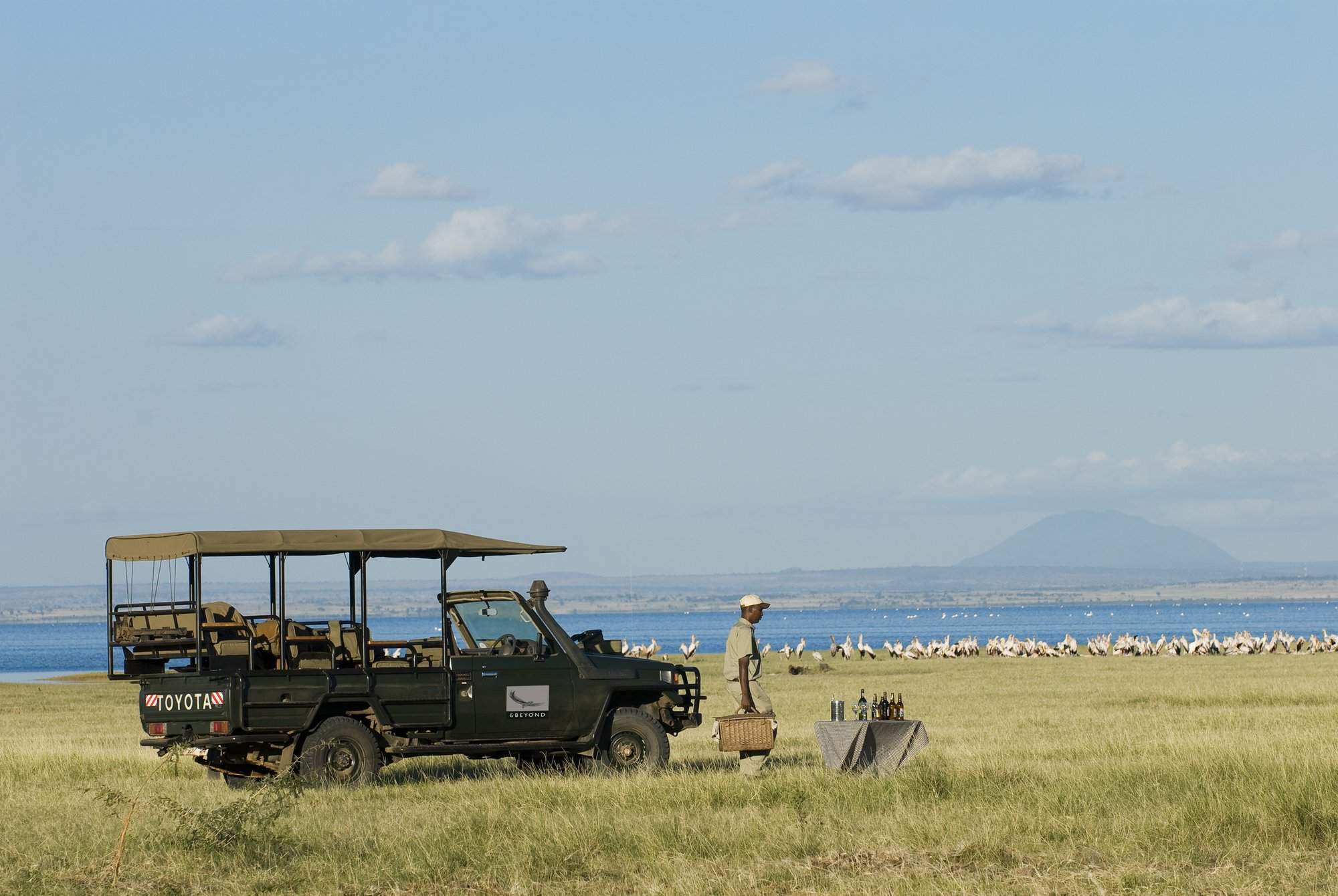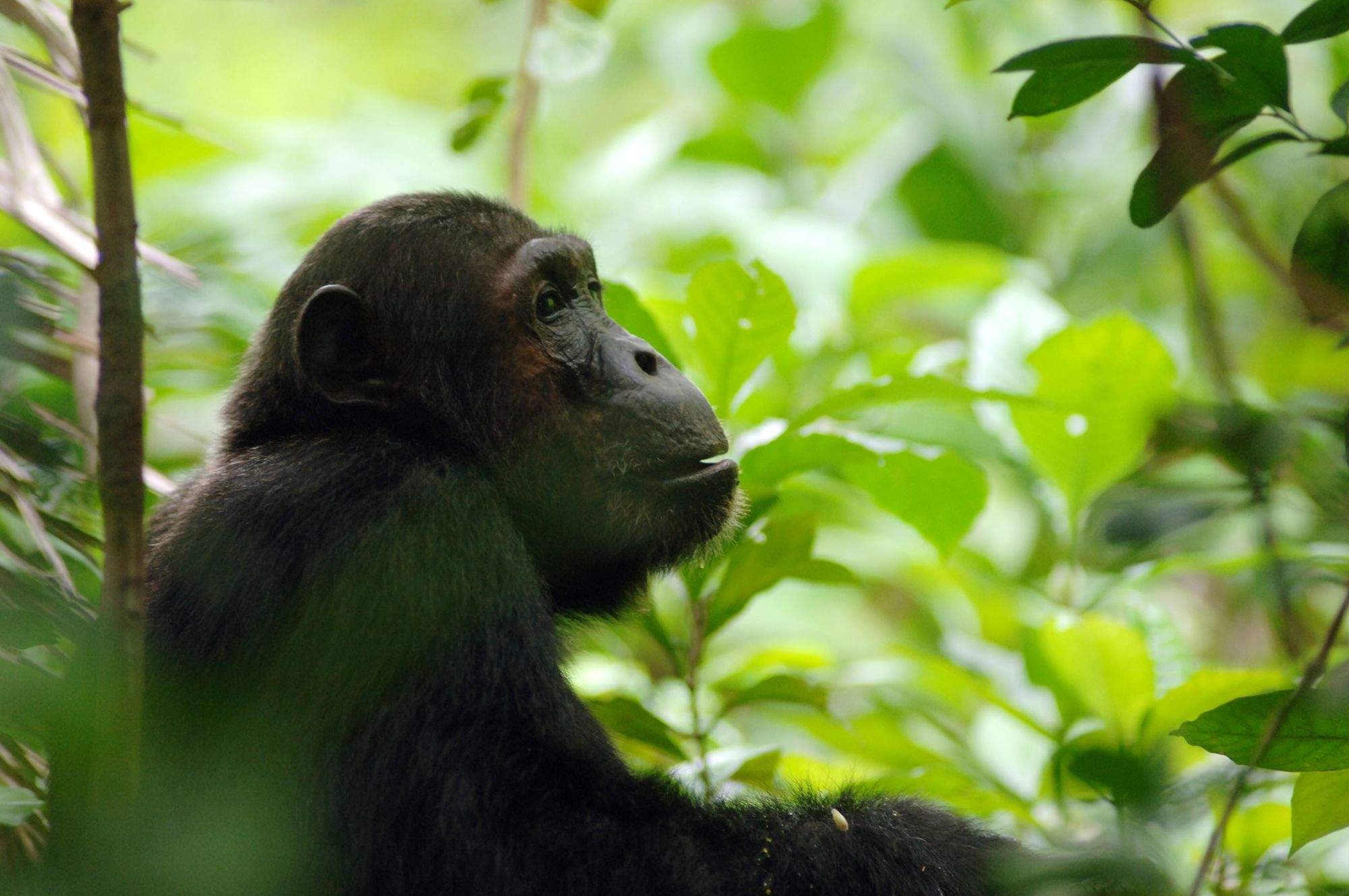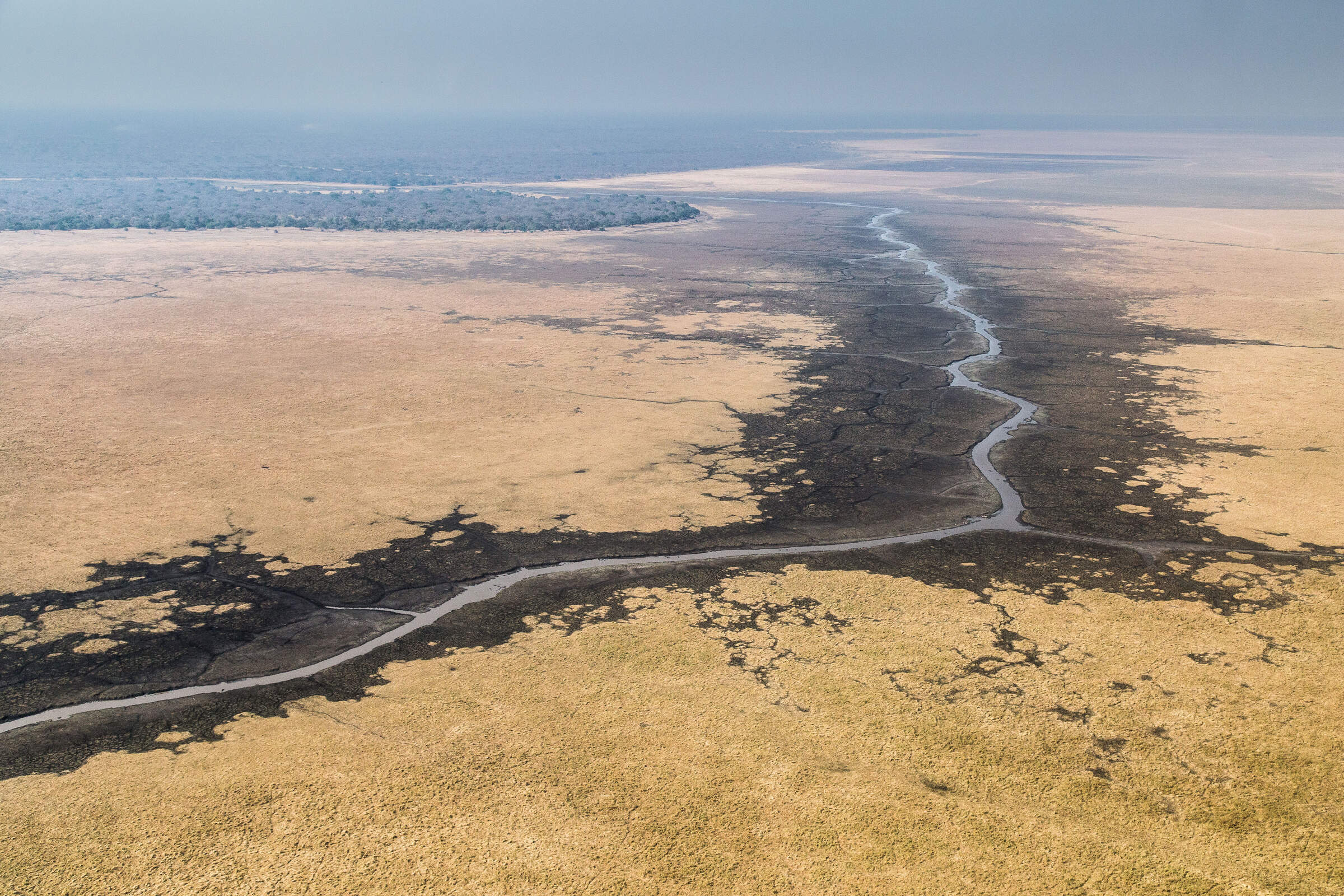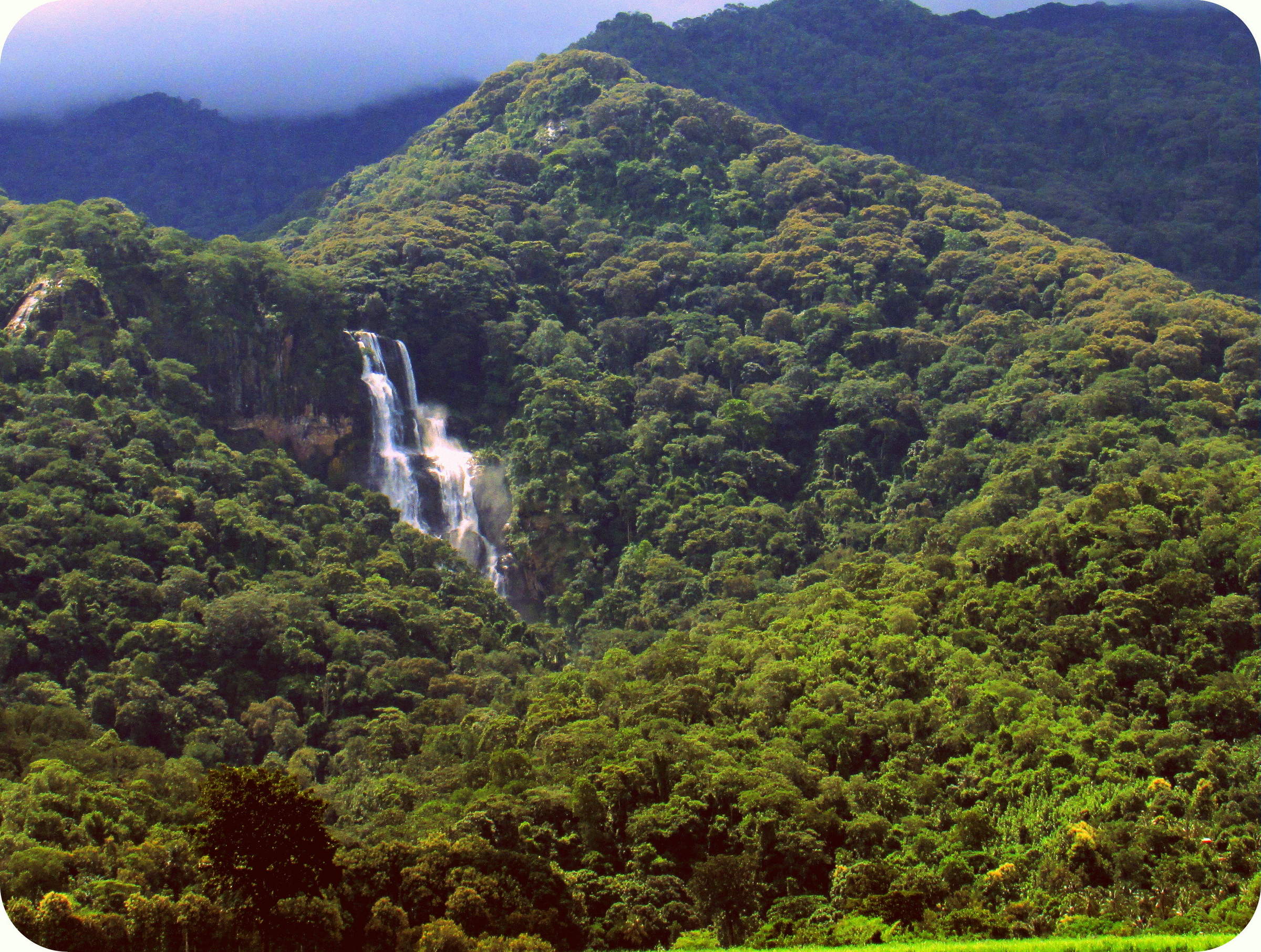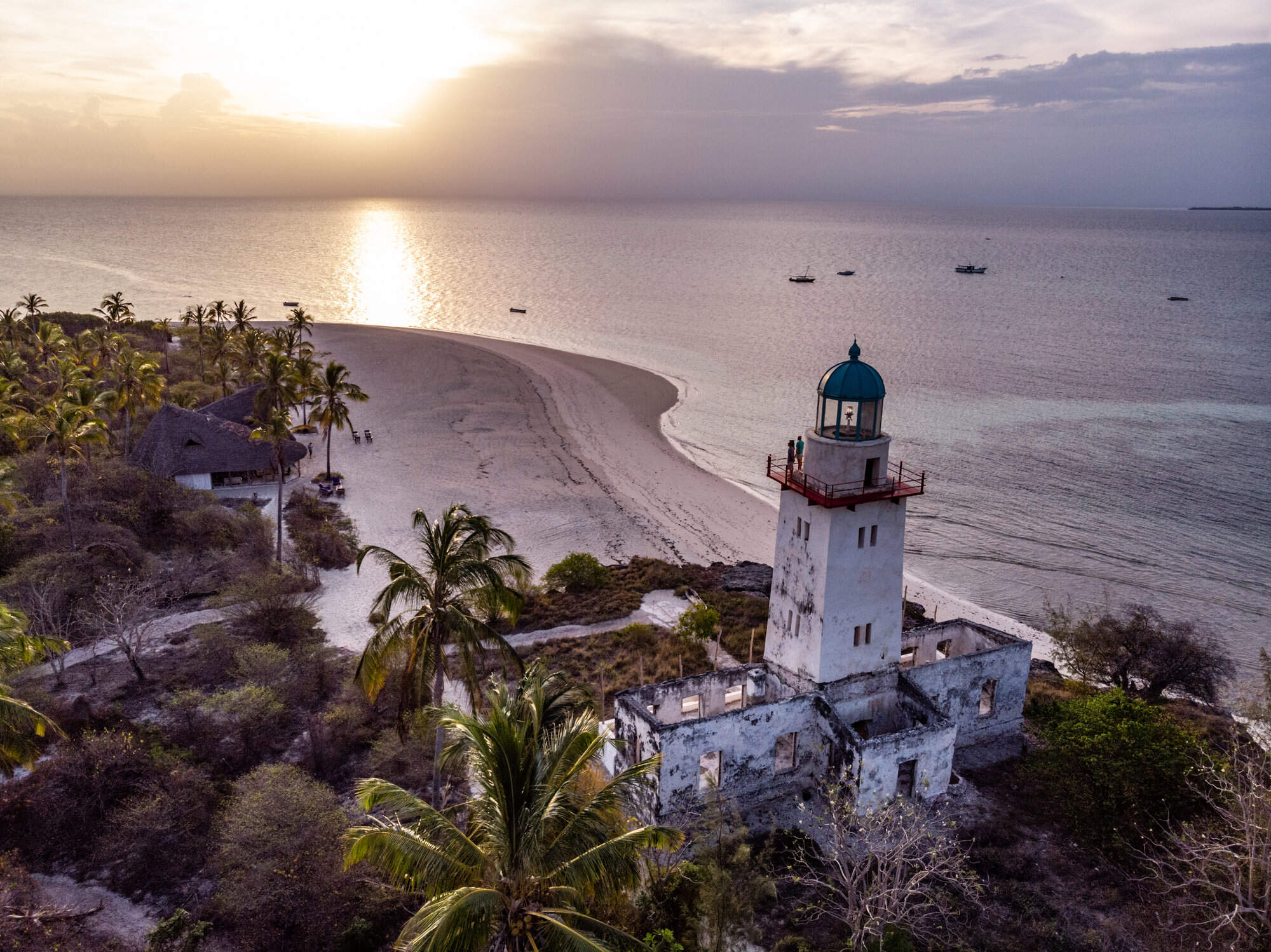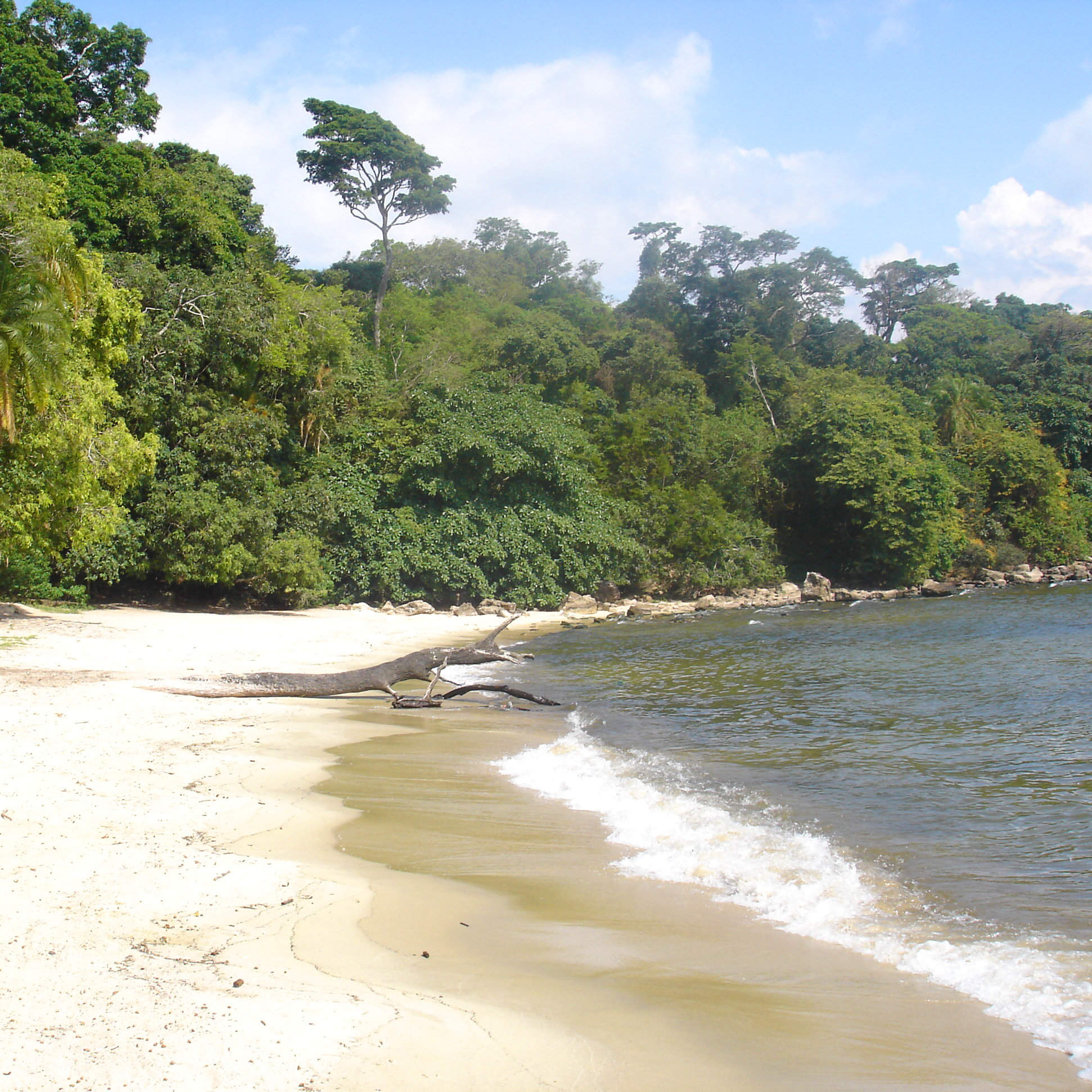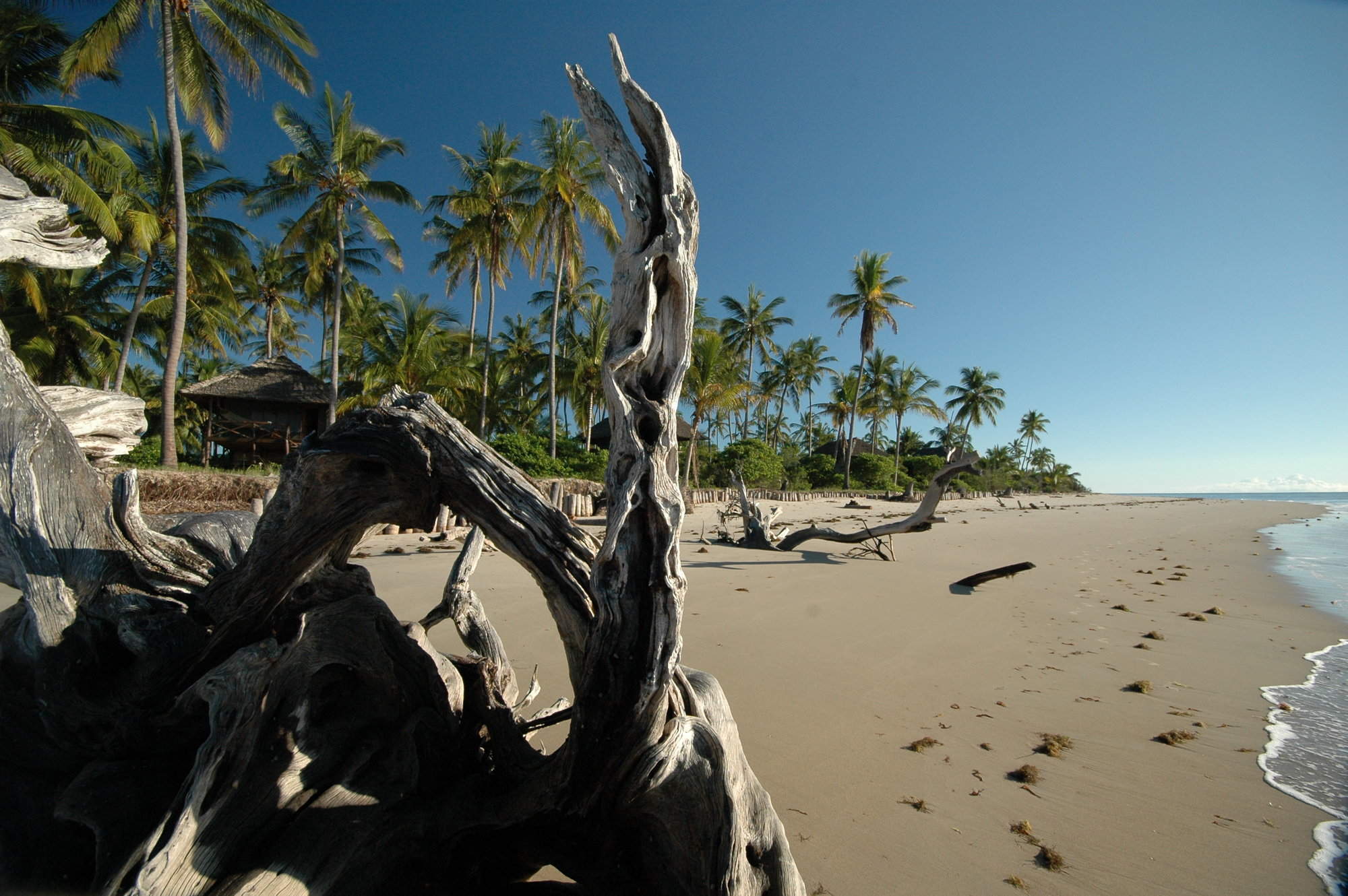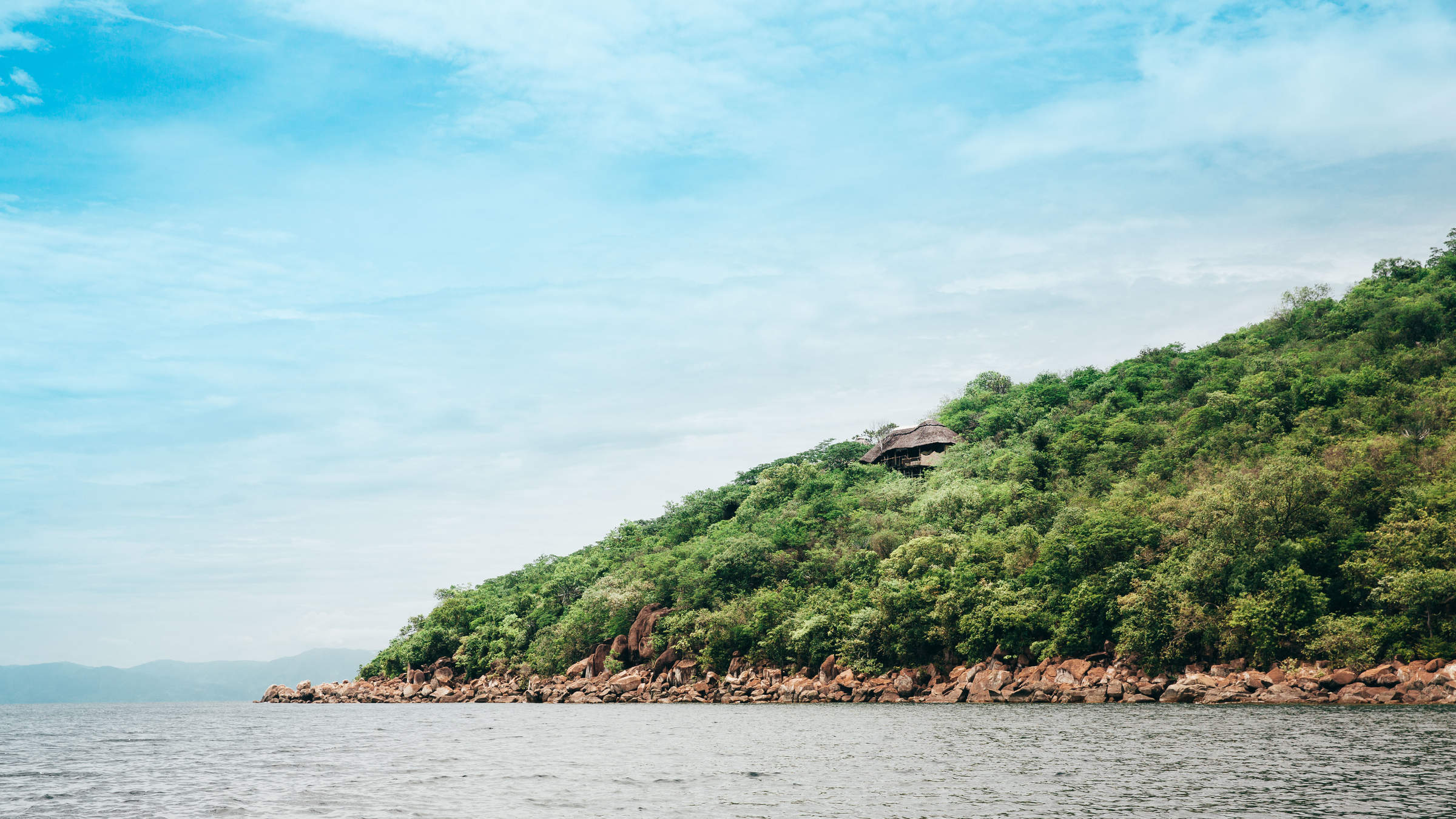Jongomero Camp: Our full report
Stylish and with a slightly colonial edge, Jongomero Camp is similar to its sister camp Siwandu.
It has smooth and seamless service and plenty of luxury, but despite this, Jongomero has retained a real sense of wilderness. Located in the far south of Ruaha National Park, Jongomero is a long way from any other camp. This part of Ruaha is both quiet and spectacular − it's a real wilderness experience. It is extremely unlikely that you will come across any other vehicles while on safari around Jongomero.Jongomero Camp faces south and is spread roughly west to east along the banks of the Jongomero River, which flows strongly in the rains, but is usually just a sandy river bed during the dry season. Even when dry, it's a corridor and you can sit on your veranda and watch as a variety of animals walk along it. Elephants frequently wander past, digging into the sand, trying to tap into the water beneath.
The eight tented rooms at Jongomero are raised up on wooden platforms, and have great views across the river. They essentially all have at least a180-degree view, while tent #1 has a 270-degree view. Tents #1 and #2 are to the west of the main, central area and being a little more private are ideal for honeymooners, while tents #3 to #8 are ranged east of the central areas and swimming pool.
All the tents are large and stylish canvas constructions – in fact tent is much too simple a word – with high-quality furnishings on polished wooden floors. Every detail is well thought through, making these some of the most comfortable and stylish rooms of any camp in southern Tanzania.
Jongomero's main lounge and dining room is similarly luxurious, it has polished wooden floors, sumptuous sofas and Persian rugs across the floors. Rustic in design, with a slight colonial twist, it's an inviting place to relax with a drink, leafing through the coffee-table books on display. The bar and lounge are in one section, while in the other, past a small curio shop, is the dining room. This is one of Ruaha's most luxurious camps, yet its high thatched roofs, and odd bits of traditional African furniture and art, somehow keep Jongomero in touch with its surroundings and stop it feeling too contrived.
For larger families or group of friends travelling together, then the private, exclusive use Bush Manor which can sleep up to 8 guests is worth a consideration. This exclusive villa comes with its own private infinity pool and lounge - dining area, along with a dedicated staff team.
Located along the banks of the Ruaha river, a 35 mins drive from the lodge, is Laba Jongomero's thermal bush spa, which offers guests the opportunity to bathe in natural pools of volcanic hot springs water. The area is thoughtfully landscaped with wooden decking and sun loungers to rest and relax. For an additional cost there is a full menu of massage and spa treatments which can be booked between the hours of 10am and 6pm.
Safari activities at Jongomero Camp revolve mainly around 4WD game drives – and timings are generally flexible and intelligent, though the evening drives always finish by 7pm. The camp has 4 Nissan safari vehicles, each with 4 passenger seats, and they carry braziers at the rear in which dried elephant dung is burned to deter tsetse flies.
Breakfast can be organised around your plans for the morning, and a picnic lunch is packed for longer days in the bush. The camp has also introduced fly-camping and safari walks which only operate in the dry season July to December, and led by Chris, the main walking guide and manager. These are a fantastic way to learn about the smaller things in the bush – and to get a lot closer to them. You drive out about half-way towards the fly-camping area and then walk for 6lkm before stopping for the night where the camp will have been set up by an advance party of staff. The following morning you set off early and walk the whole 12km back to camp along the Jongomero River.
The Jongomero team also run a guide training program that aims to get FGASA qualifications for all of Jongomero's already experienced guides.
Until 2008, Jongomero was situated on the edge of the park, close to a hunting concession and the game had a tendency to be a little skittish and scared of humans. Then Ruaha National Park's area was doubled in size, and several of the surrounding concessions were included within the park. This has resulted in a significant improvement in the quantity of wildlife and the quality of the game-viewing around the camp. Large herds of buffalo and elephant are regularly seen in the area and Jongomero is also in one of the best locations in Ruaha for spotting the somewhat elusive roan antelope. The camp also offers full-day game drives in to the northern areas of the park where wildlife is generally considered to be more prolific. For guests staying three nights or more, we would recommend one full day game drive to this area of the park.
When we first visited Jongomero over 20 years ago, this part of Ruaha National Park had a serious problem with tsetse flies – which can give painful bites if they get a chance. From June to October they are generally not too bad, then from November to March they tend to be a little worse. They generally seem to be less aggressive after rain. In recent years, efforts to tackle the problem seem to be working and they are no longer a reason to avoid this picturesque part of the park. On our last visit the camp was very proactive in spraying the vehicles prior to game driving and we did not find the tsetse flies to negatively impact our experience.
Our view
Jongomero's standards of service, food and comfort are very high, and you can certainly expect very good guiding. Its game densities aren't quite as high as some of the areas further east, but there is still very good wilidlife here. So if you're looking for a wilderness experience, this could be a good choice – especially when combined with the option to fly-camp.
Geographics
- Location
- Ruaha National Park, Tanzania
- Ideal length of stay
- Four nights is ideal to experience all this area has to offer. For a longer stay in the park we recommend that you combine it with Mwagusi Camp.
- Directions
- From Dar es Salaam, Jongomero is around a 12-hour drive. Most guests take the 2hr flight to a nearby airstrip, from where it's only about 2km to the camp.
- Accessible by
- Fly-and-Transfer
Food & drink
- Usual board basis
- Full Board & Activities
- Food quality
- The food at Jongomero is fresh and plentiful, with an imaginative and varied menu.
Breakfast is usually a light picnic while out on the morning game drive and includes excellent baked eggs and bacon and egg muffins, as well as cereals, yoghurts and fruit. Then you return around 10:30 to 11am, well before the light lunch is served around 12 noon. On our last visit, this was a brunch-style meal of falafel with a selection of salads including couscous, a green salad and also a tasty raita dip. There was a pineapple upside-down cake to follow.
Dinner, a slightly more formal affair, usually served at around 8pm, is served in a variety of locations around the lodge – for example, down on the dry riverbed, or in the bush under the stars. On our last visit we enjoyed grilled red snapper, roast potatoes, and green beans, rounded off by a delicious chocolate mousse. - Dining style
- Individual Tables
- Dining locations
- Indoor and Outdoor Dining
- Further dining info, including room service
- Private dining at your tent is usually possible.
- Drinks included
- Most drinks are included at Jongomero, with the exception of premium wines, spirits and champagnes.
Special interests
- Honeymoons
- Jongomero is a luxurious and exclusive tented camp perfect for those who want a Tanzania honeymoon combining wilderness and luxury. The service is attentive and the food is excellent – you can have romantic, private meals here.
- See ideas for Honeymoons in Tanzania
- Wildlife safaris
- You'll find all of the usual big game species in Ruaha, including elephant, large herds of buffalo, wildebeest, lion, leopard, occasional cheetah and wild dog. Ruaha also has a few species associated with the parks further north, including Grant's gazelle and lesser kudu.
- See ideas for Wildlife safaris in Tanzania
- Luxury
- Jongomero Camp is perfect for those seeking a luxurious African adventure. The rooms are rustic, yet stylish with sumptuous sofas, huge four-poster beds and Persian rugs. This idyllic camp blends in beautifully with its surroundings and its location guarantees a remote getaway.
- See ideas for Luxury in Tanzania
Children
- Attitude towards children
- The camp allows children over the age of 10 - however it tends to appeal more to couples than families.
- Property’s age restrictions
- Children must be aged 10 years or older
- Special activities & services
- There are no special activities available for children
- Equipment
- There is no special equipment on offer for children.
- Generally recommended for children
- Jongomero Camp has a swimming pool, so could be a good option for families with children. However, the camp is both wild and relatively quiet, and tends to attract couples rather than families.
- Notes
- Jongomero has no fences, and is in an area of dangerous big game. Hence we feel that this camp is best for more mature children with an interest in wildlife – and wouldn't suggest it for anyone under about 10 years of age.
Our travellers’ wildlife sightings from Jongomero Camp
Since mid-2018, many of our travellers who stayed at Jongomero Camp have kindly recorded their wildlife sightings and shared them with us. The results are below. Click an animal to see more, and here to see more on our methodology.

100% success

100% success

100% success

100% success

100% success

89% success

44% success

43% success

22% success

14% success

0% success

0% success

0% success

0% success

0% success

0% success
Communications
- Power supply notes
- The lights can be used throughout the day and power sockets are on 24/7 for charging batteries.
- Communications
- Good WiFi throughout.
- TV & radio
- There is no TV at Jongomero.
- Water supply
- Borehole
Health & safety
- Malarial protection recommended
- Yes
- Medical care
- All staff are first aid trained and there is a first-aid kit on site and also in all vehicals. For serious emergencies the camp can use the flying-doctor service.
- Dangerous animals
- High Risk
- Security measures
- You will always be escorted to and from your room by an askari (guard) at night, as a precaution against wildlife.
- Fire safety
- There are fire extinguishers in the rooms and communal areas and the staff at Jongomero are trained to use them. There are also fire breaks around the camp.
Activities
4WD Safari
Birdwatching
Fly-camping
Guided walking safari
Hot air ballooning
Private activities
Extras
- Disabled access
- Not Possible
- Laundry facilities
- Full Laundry Service - Included
- Money
- There are no currency exchange facilities here.
- Accepted payment on location
- The camp prefers guests to use cash (dollars, pounds and euros) to settle bills. However, they will also accept Visa, MasterCard and Amex – though there is a 5% surcharge for this.
Room types at Jongomero Camp
Tented rooms
The spacious tented rooms at Jongomero are constructed of wood with canvas walls, under a large thatched roof. All are raised on wooden platforms overlooking the Ruaha River and well shaded by the native riverine forest. They are very stylish and thoughtfully put together with a natural feel – with high-quality furnishings used throughout.
Inside you will find highly polished wooden floors, and a vast double bed, its frame made from chunky, reclaimed dhow wood that has been beautifully restored without losing its gnarled character. A comfortable leather armchair invites relaxation in the heat of the day. In 2016 Jongomero also introduced new desk fans to help keep you cool during the summer months.
A veranda at the front of each tent is furnished with a day bed and two comfortable chairs. With a passing breeze and shade from the surrounding trees, this is an inviting place to sit and watch the wildlife.
At the back of the tent – through a canvas door which can be rolled up to create an open-plan effect, or let down for increased privacy – is the equally spacious and stylish en-suite bathroom.
Along one side, twin wash basins are set into a large wooden plinth, with a clothes-hanging space opposite. There is a standard flush toilet as well as a big, solar-heated shower. Useful toiletries are provided.
Other lodges in Ruaha National Park
Alternative places to stay in this same area.

